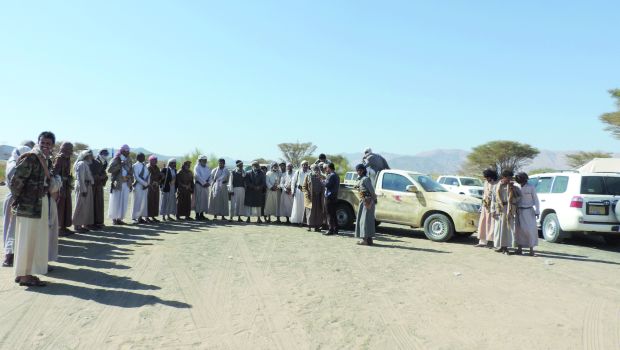
Yemeni tribal fighters gathered in Matarih area on the outskirts of the western city of Ma’rib. (Asharq Al-Awsat.)
Ma’rib, Asharq Al-Awsat—More than 14,000 tribal fighters have been placed on high alert in Yemen’s western Ma’rib governorate ahead of a feared Houthi attack on the strategic province, local tribal sources told Asharq Al-Awsat.
Speaking to Asharq Al-Awsat, tribal Sheikh Saleh Al-Najaf said local tribes have deployed more than 14,000 fighters on the northern and western borders of Ma’rib city after the Houthis threatened to storm the province to purge it from radical Islamist fighters. The Sunni-dominated governorate is home to the bulk of Yemen’s oil and gas resources and control of the region would constitute a significant coup for the Shi’ite Houthi movement.
Sheikh Najaf said more volunteers would be joining anti-Houthi ranks soon, pledging that no “rebels” will be allowed to enter the province.
Over the past five months, Ma’rib tribes have been able to train and equip thousands of fighters in the mountainous desert area that links the western province with Sana’a. Ma’rib’s tribal leaders have now deployed the fighters to border positions, dubbed Matarih, on the outskirts of tribal areas, to push back against any Houthi advance.
“We have directions from the President of the Republic to protect public interests and the security and stability of the province,” Najaf said.
“We support the legitimate President Abd Rabbuh Mansur Hadi. As for the Houthis, they are occupiers, invaders and terrorists,” he added.
Many in Yemen blame the government for failing to curb the Houthi advance across the country, with some pointing to collusion between the Shi’ite group and government officials who sympathize with former President Ali Abdullah Saleh.
“The people of Ma’rib stand with the [Yemeni] state and army against saboteurs and terrorists but government bodies should shoulder their responsibilities,” the Ma’rib tribal sheikh told Asharq Al-Awsat.
He also warned that Yemen’s powerful Sunni tribal forces, which have predominately backed the government against the Houthis, could move to take measures into their own hands if the military continue to fail to engage the advancing Houthi fighters.
“If Houthis enter our province and we find there was betrayal on the part of the military camps in Ma’rib, we would be saying goodbye to our oil interests,” he said.
The region falls under the control of a supreme tribal council consisting of the leaders of the main local tribes and tasked with the distribution of fighters, ammunition and food rations.
“All fighters represent their tribes and they have no connections with any political parties,” Sheikh Abdullah Ahmed Al-Sadhan of the Obeida tribe told Asharq Al-Awsat.
“Each tribe is funding itself and provides for all its fighters’ needs, from weapons, ammunition, foods and vehicles,” he added.
The Ma’rib tribal fighters have been divided into teams of twenty, with checkpoints being established at 15 km increments along the border in order to prevent Houthi infiltration. Heavy weaponry, including anti-tank guns, anti-aircraft missiles and makeshift armored vehicles, have also been stationed at the region’s borders.
